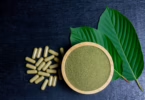https://www.thefix.com/kratom-compounds-are-opioids-says-fda

As dangerous as the FDA says?
The U.S. Food and Drug Administration is determined to convince the public that kratom is more harmful than beneficial—though the people who swear by the herbal supplement would disagree.
On Tuesday, Feb. 6, the FDA released a new statement that goes over a new scientific analysis allegedly “providing even stronger evidence of kratom compounds’ opioid properties.”
“Our concerns related to this product, and the actions we’ve taken, are rooted in sound science and are in the interest of protecting public health,” said the statement by FDA Commissioner Scott Gottlieb. These “concerns” include the potential for abuse, addiction, and serious health consequences including death, the statement read. After looking at poison control and medical examiner data, and data from existing research, the FDA counted 44 total deaths associated with kratom.
The agency concluded that it “feels confident” in referring to certain compounds found in kratom as “opioids.” Using a computational model called PHASE (Public Health Assessment via Structural Evaluation), the FDA said it found evidence that these compounds, including the active ingredient mitragynine, interact with the body’s opioid receptors. Thus, the agency concluded, “compounds in kratom make it so it isn’t just a plant—it’s an opioid.”
This is a pretty harsh statement, considering the community of people who rely on kratom to live a normal life, like Andrew Turner, a disabled military veteran who regularly posts YouTube videos about kratom and how it has relieved his anxiety and movement disorder.
The Huffington Post reported that the American Kratom Association accused the FDA of presenting “discredited, incomplete, and mischaracterized scientific claims” about kratom, and urged the agency to “rescind” its statement.
“For years, the FDA has published scientifically inaccurate information on the health effects of consuming kratom, directly influencing regulatory actions by the DEA, states, and various local government entities,” said the AKA in a statement. “It is inconceivable that the FDA would favor a policy that would foreseeably force a patient who [has] been weaned off of opioid [addiction] back to dangerously addictive and potentially deadly opioid prescription medications.”
The FDA said it is “especially concerned” about people who use kratom to treat opioid withdrawal, and though it states that it is open to reviewing evidence that kratom does have medicinal properties, it so far has not come across any “that would meet the agency’s standard for approval,” and warns against using kratom to treat medical conditions or as an alternative to prescription opioids.
Advocates of kratom and drug policy reform alike were not amused by the FDA’s latest statement. “It’s outrageous that this is happening at a time when we really need innovative solutions to deal with overdose and addiction right now,” Jag Davies of the Drug Policy Alliance told the Huffington Post. “We know that kratom is a lot less harmful than lots of these other drugs. They’re basically pushing people into using more dangerous substances.”







